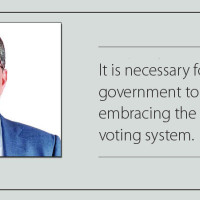- Wednesday, 11 February 2026
Politics Takes U-turn Over Presidency
Nepali politics has taken a dramatic twist as the country braces for the election of new president. The five-party alliance, led by Nepali Congress, has been revived, with an addition of three more parties but the newly-formed seven-party alliance, orchestrated by CPN-UML, has collapsed over the selection of presidential candidate. This unexpected political development took place one day before the political parties field the candidacy for the post. The making and breaking of ruling alliances risks triggering another round of instability in the country. This also poses challenges to the nation-building task in the spirit of new constitution promulgated in 2015.
A meeting of eight political parties involving Nepali Congress (NC), CPN-Maoist Centre, CPN-Unified Socialist, Janata Samajbadi Party (JSP), Janamat Party, Loktantrik Samajbadi Party, Nagarik Unmukti Party and Rastriya Janamorcha has decided to support NC’s candidate Ram Chandra Paudel in the election of president slated for 9 March. Paudel will contest with UML vice chair Subash Chandra Nembang in the top constitutional office. As per the tentative power-sharing deal of the new alliance, the NC will get the President, JSP the Vice President and the Maoist Centre the Vice Chairman of the National Assembly. The three parties – NC, Maoist Centre and Unified Socialist – will lead government on a rotation basis. Unified Socialist chairman Madhav Kumar Nepal will become prime minister for one year after Prachanda and NC president Sher Bahadur Deuba will hold the highest executive post for two years after Nepal but Prachanda has wished to lead the government for more than two years after the post of president went to the NC's fold.
Blow to Oli
This is a big blow to UML chairman Oli who masterminded to break the NC-led alliance by supporting Maoist Centre chair Pushpa Kamal Dahal Prachanda to become Prime Minister on December 25. The UML-led alliance has fallen apart more than two months after it was formed as both Prachanda and Oli were divided on the choice of new president. As per their verbal agreement, the Maoist Centre will get the premiership and the UML the president, while both the left parties will share the Speaker on a rotation basis. With the NC's backing to Prachanda during the vote of confidence, the wind of politics began to blow to another direction.
Prachanda began to stress electing a consensus figure to the post of president, citing that the situation has changed a lot since the UML and Maoist Centre entered a deal that led to the breakdown of NC-led alliance. The NC had refused to let Prachanda lead the new government despite promising him so. The NC that felt jilted by Prachanda has cheerfully returned to power. It has succeeded to bag the president and become a pivotal player in the new political equation. Stung by Prachanda’s move, the UML said it would push the country onto ‘endless instability.’
Oli’s overbearing attitude has been blamed for the disintegration of the seven-party coalition. Prachanda has said that he was compelled to correct the course set on December 25. He has complained that Oli ganged up with other ruling parties to ‘encircle’ him, making it difficult for him to work independently. Oli headed a powerful political mechanism of the ruling parties but he did not discuss the matters related to the government through this platform. Instead, he discussed and decided the major issues at their secret meetings with Rastriya Prajatantra Party (RSP) and Rastriya Swatantra Party in Balkot and then pressed the PM to implement them, according to Prachanda.
Oli ruled the roost from the day of the distribution of the ministerial portfolios. The Maoist Centre wanted to keep the Home Ministry with it but Oli unilaterally announced that the RSP would take this ministry to the displeasure of Prachanda. Not only this, Oli also managed to allot lucrative ministries to RPP without consulting Prachanda but totally ignored other ruling parties – JSP, Nagarik Unmukti Party and Janamat Party. Prachanda wanted to give important ministries to these parties that sympathised with him but could not do so. Prachanda also cringed when Oli defended his move to dissolve the parliament twice in the past. If the UML gets the president, Prachanda thought he would be further cornered and rendered helpless. It is evident that he felt insecure while playing second fiddle to Oli and decided to support the NC for the presidential post to check and balance the ruling equation.
Last-ditch efforts
In a last-ditch attempt to save the ruling coalition, Oli proposed Unified Socialist chair Madhav Kumar Nepal as the presidential candidate. Though Nepal was positive about Oli’s offer, it was too late since Prachanda had already made up his mind to support the NC candidate. By offering Nepal the presidential post, Oli had set two goals – to sustain the alliance and merge the Unified Socialist into the UML in the long-run so that his party would become the largest force in the parliament. Although Oli’s strategy fell flat, it increased Nepal’s stake in the new coalition. As a result, it agreed to award him premiership for a year.
One reason why the Maoist Centre is ready to back the NC in the presidential position is that the former rebels want to conclude the remaining task of peace process with the support of NC. There are many issues, including the transitional justice and rehabilitation of the conflict victims. The Maoist leaders have complained that the UML is least interested in sorting out the pending issues of the peace process. The international community has also been calling for ensuring transitional justice to the conflict victims. It is believed that the Maoist Centre and the NC will cooperate with each other in resolving the complicated issues of decade-long insurgency in earnest.
(The author is Deputy Executive Editor of this daily.)
















